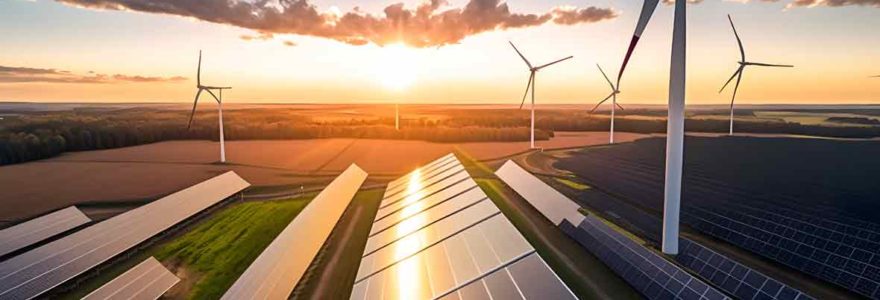In an era of environmental challenges and escalating ecological concerns, the pursuit of renewable energy solutions has never been more critical. Europe, with its progressive environmental policies, has emerged as a beacon for sustainable energy research and innovation. As the continent shifts towards a greener future, those interested in spearheading this transformation are increasingly considering advanced studies in renewable energy. Specifically, a Master's program in this domain offers not only academic enrichment but also a unique opportunity to actively partake in the creation of a sustainable world.
The Landscape of Renewable Energy in Europe
Europe has firmly positioned itself at the forefront of the renewable energy revolution. With various countries establishing benchmarks and targets for clean energy, the continent offers a dynamic and evolving renewable energy landscape.
Leading Countries in Renewable Research
Countries such as Germany, Denmark, Spain, and Sweden are pioneers in renewable energy master’s in Europe. With their innovative approaches to wind, solar, and biomass energy solutions, these nations drive technological advancements and set global standards. Their commitment to reducing carbon footprints and harnessing sustainable energy sources has paved the way for significant investments in R&D, infrastructure, and education.
Current Energy Transition Initiatives
The European Green Deal, initiated by the European Commission, underscores the continent's ambition to become the first climate-neutral bloc by 2050. This involves a complete overhaul of energy systems, focusing on energy efficiency, decarbonizing energy-intensive industries, and increasing reliance on renewable sources.
Job Market and Industry Outlook
With the amplified focus on renewables, the job market in this sector is burgeoning. Roles ranging from research scientists to project managers and policy analysts are on the rise. Additionally, the industry promises a rewarding career, both financially and ethically, given the global urgency to adopt renewable energy sources.
Key Components of a Renewable Energy Master's
A Master's in Renewable Energy is a meticulous blend of theoretical knowledge and practical insights, ensuring students are equipped to lead the energy transition.
Core Curriculum and Subjects
Students typically delve deep into subjects like photovoltaic systems, wind energy technology, energy storage techniques, and energy management. These core areas lay the foundation for understanding the complexities and nuances of renewable energy solutions.
Practical Training and Internships
Integral to such programs is the hands-on experience gained through internships with leading energy firms, research institutions, and think tanks. This exposes students to real-world challenges and offers a platform to apply theoretical knowledge.
Thesis Projects and Research Opportunities
Most Master's programs culminate in a thesis project, where students undertake original research, often contributing significantly to the field. The rich academic and industrial ecosystem in Europe offers diverse research opportunities in renewables.
Top Institutions Offering Renewable Energy Master's
Europe houses some of the world's premier institutions in renewable energy research and studies.
University Rankings and Recognition
Universities like the Technical University of Munich, University of Oxford, and KTH Royal Institute of Technology have consistently ranked high for their programs in renewable energy, reflecting their unparalleled academic rigor and research contributions.
Specialized Research Facilities
Leading European universities boast state-of-the-art labs, simulators, and research centers dedicated to renewables. These facilities play a pivotal role in nurturing innovative solutions and technologies.
Collaborative International Programs
Many European institutions collaborate with universities worldwide, fostering an inclusive learning environment. These collaborations often result in dual degrees, international internships, and diverse research projects.
Navigating the Application Process
Embarking on a Master's journey in Europe necessitates a thorough understanding of the application process.
Prerequisites and Entry Requirements
Most universities demand a relevant undergraduate degree, letters of recommendation, a statement of purpose, and proficiency in English or the primary language of instruction.
Tuition, Scholarships, and Funding Opportunities
While tuition varies, numerous scholarships, grants, and funding opportunities are available for deserving candidates, reducing financial burdens.
Life as an International Student in Europe
Europe's rich cultural tapestry, combined with its commitment to sustainability, offers international students a holistic and enriching experience, both academically and personally.
Shaping the Sustainable Future
Equipped with a Master's in Renewable Energy from Europe, graduates find themselves at the epicenter of a sustainable revolution.
Forging a Career in Renewable Energy
Beyond the immediate job prospects, a career in renewables promises long-term growth and the opportunity to make tangible contributions to a global cause.
Contributing to a Greener Future
Every renewable energy solution implemented, every research paper published, and every policy influenced by these graduates plays a part in sculpting a more sustainable planet.
Europe's Continued Leadership in Sustainable Practices
Given Europe's unwavering commitment to the environment and renewable energy, the continent is poised to remain a global leader in sustainable practices, beckoning those eager to be at the forefront of change.
